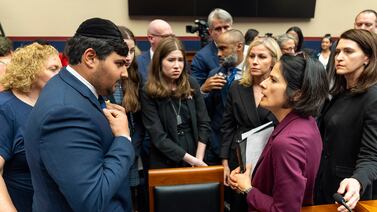To address youth violence, eight Denver schools would get an additional staffer focused on student behavior next school year, under a proposed city council ordinance.
The proposed pilot program also would add a mobile team going from school to school, addressing mental health needs, supporting behavioral health and providing referrals.
Denver has seen high rates of youth violence over the last five years.
A plan published in 2020 noted measures that the community could take to reduce violence. But with the onset of the COVID pandemic, no action resulted.
Meanwhile, campus closures eroded many of the routines that helped teenagers stay on track. Educators report that students still are missing more school and are less engaged even when they are in class.
Earlier this year, the city produced a new plan. Among other things, it recommended improving access to mental health support in the community, including in schools.
If the city council passes the ordinance this month, the program would launch next month. The health specialist positions also are intended to serve as a career pathway for people in marginalized communities to enter the behavioral health workforce.
The bill proposes to fund the school positions and mobile services with about $860,000 in federal COVID relief funds. The idea is to shift from responding to violence and instead preventing it, said June Marcel, a Denver Public Schools strategy officer.
“Wouldn’t it be better if we could prevent the tragedies from happening in the first place?” she said.
In designing and offering the program, the city will collaborate with Denver Public Schools and community organizations.
School officials said they chose three campuses with two programs each, one a comprehensive high school and the other focusing on careers or serving older students. They are North High School and the North Engagement Center, Abraham Lincoln High School and Respect Academy, and George Washington High School and DELTA High School. They also chose two middle schools, West and Lake.
The new behavioral staffers, dubbed “community navigators,” are intended to help encourage attendance, assess students’ needs, and connect families with city and community resources. The pandemic compounded many problems like chronic absenteeism, disengagement, academic struggle and financial insecurity.
Navigators may work both on campus and in the community. Officials hope to fill those jobs with people interested in behavioral health who may have a shared cultural experience with students and are bilingual.
Schools already have counselors, and some have attendance specialists, but none have health staff specifically tasked with preventing youth violence, Marcel said.
The pilot project is intended to meet some of the needs identified in the Behavioral Health Needs Assessment that the city conducted last year and this year’s youth violence prevention plan.
Last year’s survey found that many people who need behavioral health services have a hard time finding help, with cost, transportation, and lack of convenient appointments all playing a role. Teenagers reported having an especially hard time getting in-person therapy — one of the problems the new partnership aims to address.
“One of the factors (of an increase in youth violence) is mental health and feelings of wellness related to the students, youth and family. If we can get a better handle on what’s underneath the behavior, what’s driving the behavior, if we can connect with the students in a way that feels right to them, we’re more likely to get a more accurate understanding of what’s going on to help,” said Nachshon Zohari, program manager for community engagement at the city’s department of public health and environment.
The mobile units would provide more mental and behavioral health services and resources at community events and when and where there might be a need. The fleet includes smaller versions of the city’s “Wellness Winnie” housed in a large RV. The so-called Mini Winnies will rotate on a schedule among schools.
With the pilot program, school officials said they will be able to identify the resources and needs of schools if the program is funded beyond the first year.
The pilot program will run from Aug. 1 to July 31, 2024.
Sara Martin is an intern with Chalkbeat Colorado. Contact Sara at smartin@chalkbeat.org








